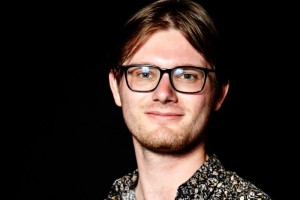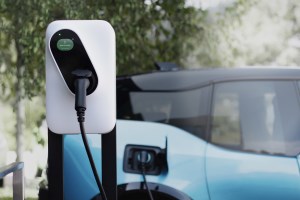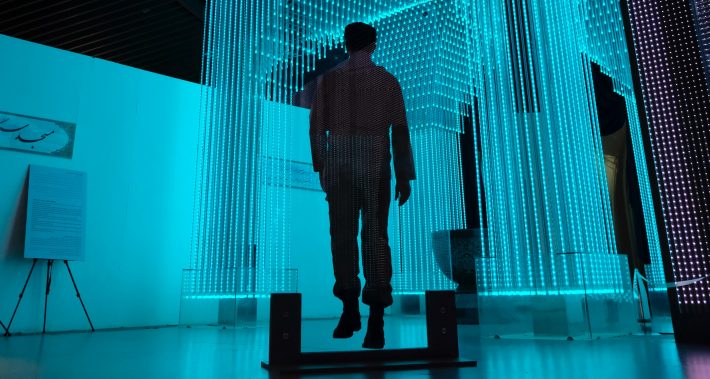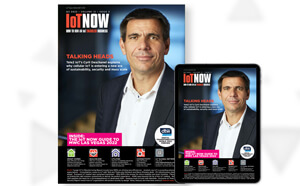The role of blockchain in the Internet of Things (IoT) is a rapidly-evolving story. Eliott Teissonniere is a polymath, engineer, entrepreneur and the chief technology officer (CTO) for Nodle, a company that has built a decentralised communications network using Bluetooth and blockchain. Here he talks to Nicholas Croce, a policy researcher studying technology and society for Mathematica.
NC: Eliott, it’s great to have a chance to chat with you. Many folks think about cryptocurrency in terms of investment, and between inflation and the meme stock craze, we all know it’s a chaotic market right now. Meanwhile, there are folks out there building the future of the internet, right now, creating something called Web3, and leveraging blockchain technology to do that.
You, in your role as CTO at Nodle, are one of those people building new tools and infrastructures that are the internet, sure, but more than that, they’re about enabling the evolving ways in which we live, work, and play. Could you tell us a little bit about Nodle: what is it, what are the problems it seeks to solve today, and what does Nodle’s infrastructure intend to support tomorrow?
ET: Nodle is a unique approach to building efficient, scalable, and privacy-first infrastructure for the internet. It is a robust infrastructure to connect small, embedded devices (also called IoT devices) to the cloud or a Web3 DApp. Today, the network is powered by smartphone users like you and me who actively help maintain and deploy it. They are incentivised to do so thanks to a stream of micro-payments in the form of NODL tokens, we call this concept “Connect to Earn”.
We hope to make this network more permissionless in the near future by allowing developers to create small scripts that would be executed by the network’s phones. We believe this will improve the Nodle stack by making it easier to maintain, but also that this will create a range of new use cases that we wouldn’t even have thought of.
NC: Okay, but really, it sounds like IoT (the Internet of Things) also stands for Internet of Tomorrow.
Let me see if I understand. When someone uses their smartphone to deploy and maintain the network, their phone becomes a node that can relay messages back and forth from IoT devices for all kinds of purposes. Companies need the Nodle (NODL) token to relay those messages, doing small tasks that are coded. Nodle’s code accommodates these small tasks and makes sure they are safe for the smartphone users. Smartphone users and app developers are rewarded with NODL for deployment of the network (by running the Nodle Cash app or SDK within existing apps). Yeah?
Internet of tomorrow
ET: Basically! I like the analogy of the Internet of Tomorrow, as many people used to believe that IoT would be the future of the internet as we know it. Indeed, more devices are being connected to the internet and becoming increasingly smarter. We started with connected fridges and now have AirTags, smart-home surveillance systems, smart scooters, etc… Yet, the industry relies mainly on closed standards, proprietary software, and expensive infrastructure while compromising users’ privacy. I believe Nodle can change this.
Nodle is a novel way to deploy IoT networks at scale. It leverages people’s smartphones to create coverage with unprecedented rapidity for a given geolocation in exchange for compensation in the form of crypto tokens. On top of standard asset tracking services, it will soon allow developers to create deeper integrations with its services: capabilities like data collection, remote device audits, firmware update deliveries, and much more.
NC: You know, in a way, it’s the elephant in the room, so I’m going to just say it. So many people, and even some companies, are turned off by cryptocurrency. Sure, there’s the “HODL” crowd, but a lot of people especially young folks have already decided that cryptocurrency is bad: characteristic of the greed and speculation in today’s markets, bad for the planet, superfluous, and a distractor from bigger social problems. What’s your response? And perhaps relatedly, how do you feel about the term “cryptocurrency” generally, and do you think in 10 years we’re still going to be calling this thing that?
Cryptocurrency is the wrong term

ET: Let me be honest. I hate the term cryptocurrency. I think it is too technical, does not mean much, and even worse, constrains our thinking. Indeed, most people use the word “cryptocurrency” to refer to any Web3 or blockchain-based project. Some of them might have a currency or token supporting them, and some don’t. It sounds like the term “Web3” is gaining a bit more traction versus “cryptocurrency” it might not be perfect, but it certainly is an improvement. It includes the idea of non-currency-based systems along with the concept of a community doubled with its own culture and movement. In many ways, it represents idealism and hope for a better economy or global infrastructure. To me, “Web3” is synonymous with change.
Now, I’m not going to tell you that every crypto/Web3/blockchain project is perfect. We should recognise that we are still pretty early; we need to improve across the board. But I do need to disagree with the idea that Web3 is distracting from bigger social problems. The Web3 movement stems from multiple roots such as distrust in the world’s elites, the fear of government-(un)controlled inflation, as well as a disappointment in how our data is commercialised and weaponised against us, or how today’s economic models work for artists, developers, and makers who end up being almost exploited by the same platforms that support them. Wouldn’t you say these are pretty big and important social problems?
NC: Beyond “big.” They lie at the heart of today’s politics. It’s pretty hard to wrap one’s head around the fact that one technology blockchain could address all of these anxieties. How is this possible? And how could someone like, say, my mom, “get it”? Or is the point that in a decade, blockchain technicals and principles won’t need to be understood by everyday folks?
ET: You are making some excellent points. It would be unrealistic to think that Web3, cryptocurrency, or blockchain depending on how you like to call it would solve all the world’s issues. Rather, it is not just a technology but also a movement and an ideology. People are calling for change and are making it happen through the power of open-source software and decentralised networks.
In many ways, you could say that we are creating the change we want to see instead of begging third parties to do it for us. Will we solve everything that’s wrong with today’s world? Probably not. But will we change it to something different, and hopefully slightly better? I certainly think this might be the case.
Your last point is extremely important. I am a strong believer that blockchain will only succeed if we abstract away from it. In other words, I shouldn’t even know that I am using a blockchain-based system when interacting with Web3 Dapps. This is what made machine learning so successful. Do you even realise you are using something called “AI” when taking a picture with your smartphone? Yet, companies like Apple are using complex machine learning systems to optimise the pictures you take. The same is true with other very successful features like FaceId, Google Assistant, and so many more.
NC: One of the things I’m really interested in as a social science researcher is economic inequality, specifically, the ways inequality can remain sticky across generations or within places. Another thing that I’ve written about is platform capitalism: how a bounded system that relies on network effects can generate value from data. Despite a growing politics that takes issue with tech giants owning so much of our data, blockchain hasn’t been seen as a potential intervention. At the same time, I see people around me getting sick of social media more generally, desiring something else. What’s going on here?
ET: I don’t know if blockchains are the perfect solution we’d like them to be when it comes to data centralisation. In fact, no blockchain is optimised to handle large amounts of data. This is why the industry is moving towards layer 2-oriented architectures, as we are starting to realise we might not be able to fit all the applications and transactions we need on a layer 1 blockchain. However, the underpinning concepts of blockchain designs could be more relevant to the debate. The ecosystem is all about developing open protocols in the most decentralised manner possible. This is a massive paradigm shift in how software is designed, and how data is managed.
It is worth noting that decentralisation is never the end goal, even in the crypto industry. Decentralisation serves the purpose of making the systems we build resistant to a variety of scenarios such as censorship, infrastructure issues, or to tolerate an adversarial environment where nobody can fully trust each other.
NC: From my perspective one of the most provocative developments coming out of blockchain is the DAO (Decentralised Autonomous Organisations). AsI wrote a few months ago,
NFT communities are experimenting with ways to tap the theoretical security, transparency, and decentralisation of blockchain structures to create decentralised autonomous organisations… An increasing number of NFT projects promise DAOs. Almost all are snake oil, a hype tactic. But a few NFT projects are experimenting with code and platform to design decentralised, electronic organisations in ways that are poised to innovate the way groups of all kinds make decisions.
For the layperson, could you explain what a DAO is, and perhaps more importantly, what you can see the structure of a DAO doing for everyday life?
ET: A DAO can be approximated as a fully autonomous entity that lives primarily on a blockchain (in the form of one or many smart contracts but let’s not get ourselves lost in the technical details). It can be used to represent various traditional structures such as a business, an association of people, an investment syndicate, or a nice and vibrant community.
I got into Web3 because of DAOs in 2017, their value proposition hasn’t changed since. A DAO can be a wonderful way to help groups of people organise themselves in a fully transparent and autonomous manner, without the need for governmental oversight, or any expensive, long, and cumbersome processes (try to open a company in France…). Would a DAO need some presence in the “real world” via a physical, government-approved entity form? Well, there are now ways to incorporate a DAO if it so wishes. In some ways, you could see it as a voluntarily “opt-in” to deal with the bureaucracy and respect the laws and regulations of the chosen jurisdiction.
NC: It sounds to me like DAOs provide an electronic infrastructure that can facilitate the governance of everything from non-profits to nations in ways that don’t require a centralised platform like a social media company or tech conglomerate-owned-cloud whatever. Who stands to lose, and who stands to win, if DAOs proliferate?
ET: I don’t think anybody stands to lose if DAOs proliferate. Indeed, organisations that can be run as DAOs are one of a kind: they are transparent by default, community-oriented, and very often international. A traditional (so-called “web2”) company would most definitely not be compatible with a DAO-based structure. For one, most corporations rely on some element of secret around compensation structures, intellectual property, or simply their business strategies.
DAOs enable new kinds of organisations to be created, and these organisations would have had a tough time existing in today’s world, which very often means they didn’t exist until now. This is the beauty of the Web3 movement, we seek to create and enable everybody to fulfill their potential. I don’t see Web3 as a full-on replacement for Web2 or traditional structures, I rather see it as a new class of use cases, technologies, businesses, and communities.
NC: This has been so interesting, and I hope people with all different kinds of viewpoints on cryptocurrency and blockchain will take time to consider what you’ve had to say. Before we wrap up, could we take a step back, and perhaps go back to where we started? As someone who is coding the socio-electronic world of tomorrow, what’s coming next?
ET: Change. The ecosystem is all about building alternative paradigms, applications, and assets. We are living through an era of radical experimentation at a scale we have never seen before. New classes of assets and technologies are being created every day with the potential to change the ways we interact with the internet, make money online, or even use day-to-day services. This is the case of Nodle, which I hope will transform the way we build real-world applications and interact with our various smart devices.
The views described here are the personal opinions of the speakers and do not seek to represent the positions of any company.
Comment on this article below or via Twitter: @IoTNow_OR @jcIoTnow







